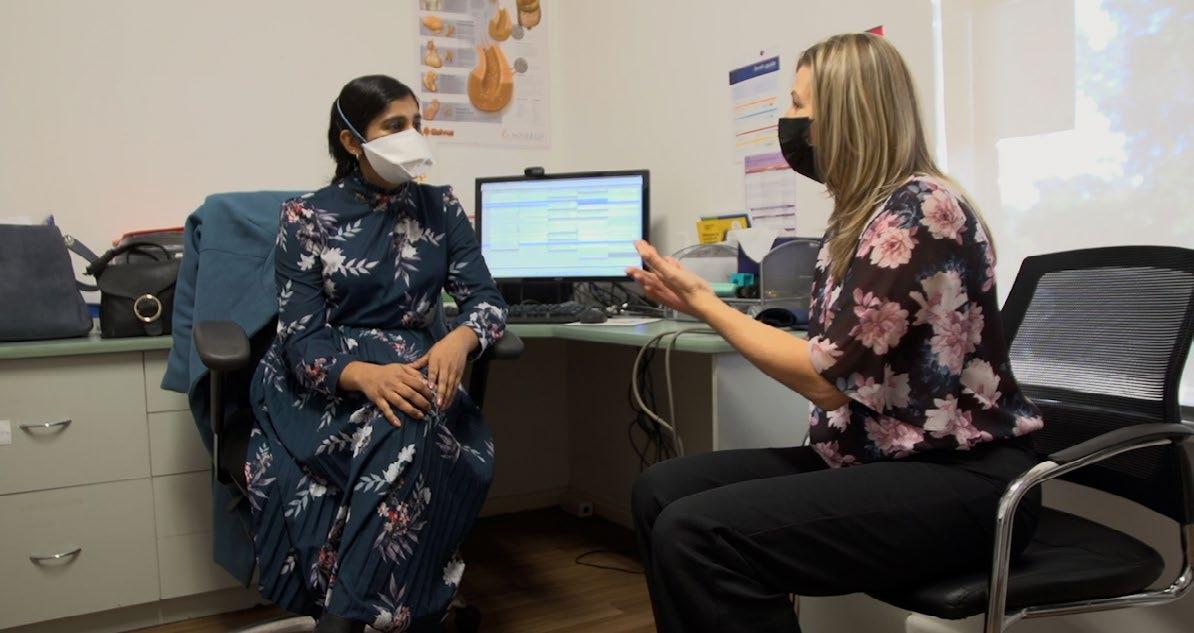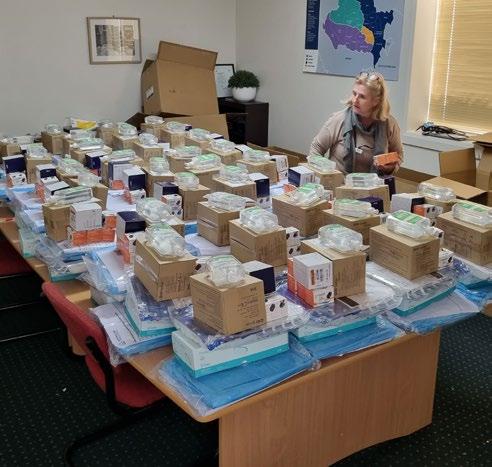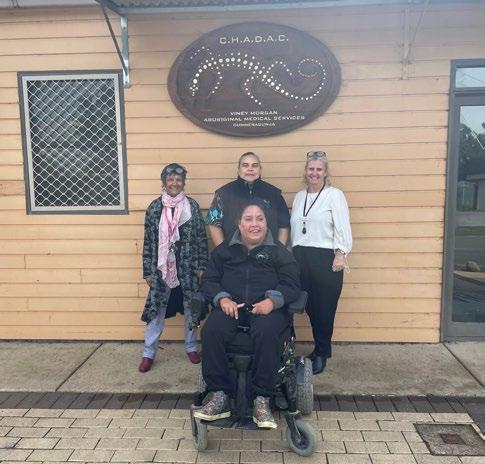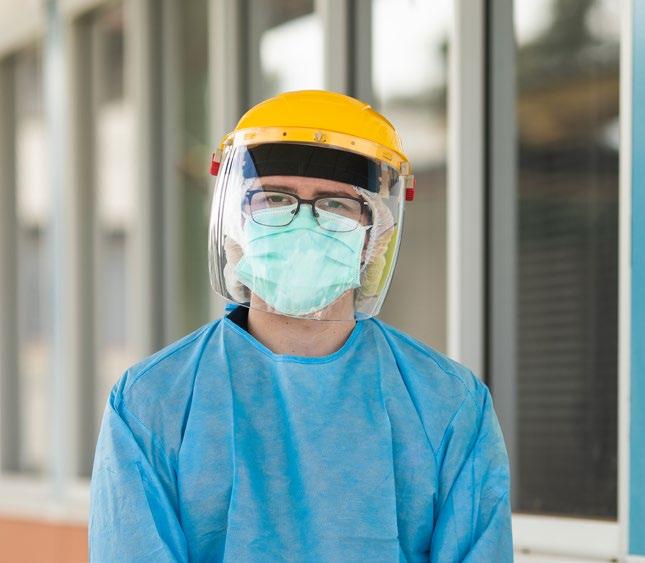
7 minute read
Response, recovery and resilience
Primary Care Clinical Coordinator Karen McDowell (R) meets with GP Registrar Dr Shanika Samuel
Delta, Omicron, anti-virals, third and fourth doses, masks mandatory, lockdown, care in the community, get tested, get vaccinated, isolation, RATs, PCR – so many catchphrases from the COVID-19 landscape, but the Murrumbidgee community and health professionals navigated the changes with diligence, coordination and compassion.
Advertisement
As the Delta outbreak took hold across New South Wales, many people living in the Murrumbidgee region were sent back into lockdowns and quarantine in July 2021 to emerge to mask mandates. Then the Omicron outbreak in December sent us racing for Rapid Antigen Tests (RATs), and queuing for PCR tests and waiting for results. Isolation periods have changed, mask mandates have eased, and those QR checkins are a thing of the past. The ever-changing COVID-rules and environment was challenging to navigate for the community, and general practitioners, practice staff, and other primary health professionals including pharmacy and allied health are to be commended for staying up to date with changes to vaccinations, testing and PPE requirements, and medications and care plans for COVID-19 patients, to ensure they delivered exemplary care to their patients, no matter their need. The region’s six GP Respiratory Clinics (GPRC) were also pivotal for alleviating pressures on the health system delivering vaccines and tests. Young GPRC’s principal Dr Asitha Wickramaratne explains “the GPRC has been able to provide thousands of vaccinations as well as being a trusted centre for testing and treatment for COVID-19 positive people. This has resulted in reduced pressure on other health services, including the local hospital.” The implementation of a Primary Care Clinical Coordinator (PCCC) role within the Murrumbidgee Local Health District (MLHD), was also critical to navigating between primary and acute care settings and increasing confidence for caring for patients in the primary care setting. Andrew Heap, MPHN’s Senior Manager Primary Care Engagement said the role, together with a suite of information sessions has enabled the care of COVID-19 positive patients at home. “As more and more people were contracting COVID-19 in the first part of 2022, many were being managed in the acute or hospital setting. However, this wasn’t sustainable, so we worked on a model to support transition of care to the primary care setting,” Andrew explains. “Then anti-viral medications became available and there was much for our GPs to understand to properly care for COVID-19 patients and prescribe the medications.
Information sessions were critical to developing knowledge and understanding. Additionally, day-to-day support was provided by the PCCC role and MPHN’s COVID-19 and Primary Care Engagement teams. Soon GPs became increasingly confident in managing COVID-19 positive patients, either via telehealth or in their practices.” Karen McDowell, a Primary Care Clinical Coordinator said confidence is high among GPs and COVID-19 diagnosis and support is just business as usual. “The great thing for me, is watching the growth that happens. So now watching the GPs run ahead with it and we are just a back up as opposed to the other way around. It’s that normalising of COVID,” Karen says. When additional support for treatment plans is needed the PCCC is always available. For Dr Shanika Samuel, a GP Registrar at KRS Health in Wagga Wagga, a telephone consultation with a young gentleman with an injury and a medical condition who had recently contracted COVID-19 warranted some additional guidance from the PCCC. Unfortunately, because of his age and not being immunosuppressed, the gentleman was not eligible for antiviral medication. It was at this stage Dr Samuel called Karen.
PERSONAL PROTECTIVE EQUIPMENT (PPE) 800,000
PPE items or equipment issued to healthcare providers • 43,750 surgical masks • 11,170 P2 masks • 8,090 gowns • 12,720 gloves • 1,790 goggles • 1,790 face shields • 166 bottles of hand sanitiser • 600 pulse oximeters
VACCINATIONS AND TESTING 128
active COVID-19 vaccination sites across the region, including pharmacy
75 6
of these are general practices
Approximately 600,000
General Practice Respiratory Clinics in Deniliquin, Gundagai, Tumut, Young, Wagga Wagga and Griffith
vaccinations have been ordered by primary care vaccination sites
COMMUNICATIONS AND PROMOTIONS 142
media engagements
5
paid social media campaigns promoting testing and vaccination reaching 185,990 people and 1,135,759 impressions
550
organic social media posts across Facebook, LinkedIn and Twitter reaching almost 142,000 people
91
COVID-19 eNewsletters issued to general practice, aged care, allied health, pharmacy and LHAC distribution lists
RESIDENTIAL AGED CARE FACILITIES 47 27
Facilities where 80-100% of residents have received three vaccination doses of these facilities have seen 80-100% of residents receive four vaccination doses
PPE packs ready for distributions; MPHN’s COVID-19 Manager Peta Anderson at Viney Morgan Aboriginal Medical Service


“The two of us went through the protocol again, and we both agreed that it was a grey area and didn’t fit the criteria, but we felt this patient was high risk,” Dr Samuel explains. Together Dr Samuel and Karen were able to make a plan to care for the young man and reduce the risk of deterioration. This was achieved through daily telehealth check ins and sending him a pulse oximeter to measure oxygen levels. “This is why I love the team that I work with. I look at the GP network, and our network, and I think we are a team of people who care about people. It’s that patient focussed care,” Karen adds. In addition to the PCCC role to support general practitioners the Murrumbidgee HealthPathways team ensured COVID-19 HealthPathways were regularly updated and maintained. MPHN’s COVID-19 team provided constant and consistent support by providing updated information and changes, additional PPE, and assistance in ordering vaccinations. Similar PPE support was also extended to the region’s private Residential Aged Care Facilities (RACFs). Perhaps the most challenging times came with the more frequent COVID-19 outbreaks within facilities. “COVID outbreaks have interrupted vaccination clinics, impacted on facility workforce, PPE supplies, and day-today facility operations,” says MPHN’s COVID-19 Manager Peta Anderson. “MPHN was able to support our privately operated RACFs with the provision of PPE in special COVID-19 bundles including gloves, goggles, face shields, hand sanitiser, masks, and gowns to replenish diminishing supplies. “We also supported wider vaccination opportunities with pop-up vaccination clinics to remote rural communities to allow everyone the opportunity to be vaccinated regardless of location. These were carefully coordinated with the Murrumbidgee Local Health District’s mobile clinics to ensure maximum coverage.” Peta continues saying her role in supporting the region’s primary care and aged care providers has been inspirational and a real privilege. “Everyone has a great sense of pride in being able to support their communities to live safely with COVID-19. We have had GPs and pharmacists travel to remote and rural communities to administer vaccines. Our residential aged care facilities have provided exemplary care to their residents, but even more so during the lockdown periods when loved ones aren’t able to visit. Everyone is united under the common goal of providing the best care no matter the conditions,” Peta shares. The hard work and dedication of the region’s primary healthcare providers was recognised with the development of a small ‘Thank-you’ campaign, comprising of video messages from MPHN staff and the community. The workforce responded too – with approximately 30 primary care providers – from general practitioners, practice nurses, allied health providers, and our commissioned service providers thanking their patients and the community for their patience. A short 15-second video was also created for use as a television commercial. All were gratefully received. “The thank you campaign really was such a small token of the region’s deep appreciation to the primary care professionals across our region. Their dedication to serving their patients while under lots of pressure with the ever-changing COVID-19 landscape is commendable. And then, for so many providers to also contribute to a community thank you in between their usual activities, this demonstrates their commitment to keeping their patients and community safe and well,” Peta says.

THANK YOU TO THE REGION’S GPRC TEAMS
A big heartfelt thank you and congratulations to the GPs, nurses and practice staff at the region’s five GP Respiratory Clinics (GPRC) in Wagga Wagga, Deniliquin, Young, Gundagai and Griffith for your tireless work in providing the community with a central location to receive COVID-19 testing and vaccinations.









